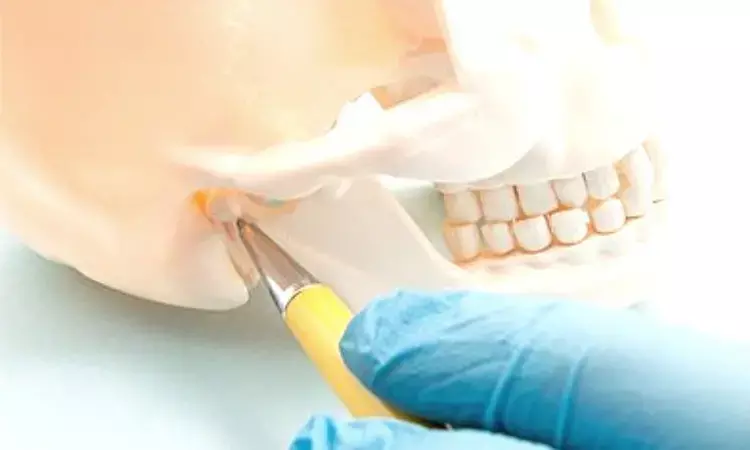- Home
- Medical news & Guidelines
- Anesthesiology
- Cardiology and CTVS
- Critical Care
- Dentistry
- Dermatology
- Diabetes and Endocrinology
- ENT
- Gastroenterology
- Medicine
- Nephrology
- Neurology
- Obstretics-Gynaecology
- Oncology
- Ophthalmology
- Orthopaedics
- Pediatrics-Neonatology
- Psychiatry
- Pulmonology
- Radiology
- Surgery
- Urology
- Laboratory Medicine
- Diet
- Nursing
- Paramedical
- Physiotherapy
- Health news
- Fact Check
- Bone Health Fact Check
- Brain Health Fact Check
- Cancer Related Fact Check
- Child Care Fact Check
- Dental and oral health fact check
- Diabetes and metabolic health fact check
- Diet and Nutrition Fact Check
- Eye and ENT Care Fact Check
- Fitness fact check
- Gut health fact check
- Heart health fact check
- Kidney health fact check
- Medical education fact check
- Men's health fact check
- Respiratory fact check
- Skin and hair care fact check
- Vaccine and Immunization fact check
- Women's health fact check
- AYUSH
- State News
- Andaman and Nicobar Islands
- Andhra Pradesh
- Arunachal Pradesh
- Assam
- Bihar
- Chandigarh
- Chattisgarh
- Dadra and Nagar Haveli
- Daman and Diu
- Delhi
- Goa
- Gujarat
- Haryana
- Himachal Pradesh
- Jammu & Kashmir
- Jharkhand
- Karnataka
- Kerala
- Ladakh
- Lakshadweep
- Madhya Pradesh
- Maharashtra
- Manipur
- Meghalaya
- Mizoram
- Nagaland
- Odisha
- Puducherry
- Punjab
- Rajasthan
- Sikkim
- Tamil Nadu
- Telangana
- Tripura
- Uttar Pradesh
- Uttrakhand
- West Bengal
- Medical Education
- Industry
Nocturnal teeth grinding can damage temporomandibular joints

Nocturnal teeth grinding and clenching of the upper and lower jaw are known as sleep bruxism and can have a number of consequences for health. In dental science, the question of whether sleep bruxism is associated with the development or progression of temporomandibular joint disorders is controversial. In a study conducted at the University Clinic of Dentistry of the Medical University of Vienna, it was found that certain tooth shapes and tooth locations could well lead to temporomandibular joint problems as a result of bruxism. The research findings of Benedikt Sagl's team were recently published in the Journal of Advanced Research.
Around 15% of the population grind their teeth while they are asleep. The problem is particularly common in younger people. The, often immense, pressure exerted on tooth surfaces and on the jaws is thought to cause various dental health problems and can also result in pain in the jaw muscles and headaches. Researchers led by Benedikt Sagl at the University Clinic of Dentistry of the Medical University of Vienna have now investigated whether sleep bruxism can also have a negative impact on the temporomandibular joint (TMJ) structures. Their research was based on the theory that specific combinations of tooth shape and tooth location during grinding have an influence on the mechanical load on the temporomandibular joint and can thus be considered a risk factor for TMJ disorders.
"Our results show that both the inclination and location of the wear facets have an influence on the strength of the mechanical load on the temporomandibular joint," explains Benedikt Sagl. "However, it would appear that the decisive factor is the steepness of the grinding facet. The flatter the tooth, the higher the loading on the joint and therefore the higher the risk of a TMJ disorder." Conversely, if the dental cusps involved in bruxism have a steeper angle of inclination, the calculated joint loading was lower, even with the same "grinding force" (bruxing force). Further research will now be conducted, coupled with clinical investigations, to establish whether this finding can be incorporated into the development of therapeutic interventions for sleep bruxism.
https://www.sciencedirect.com/science/article/pii/S2090123221000734?via%3Dihub
Journal of Advanced Research,TMJ disorders,Benedikt Sagl,sleep bruxism,Medical University of Vienna,population,
Hina Zahid Joined Medical Dialogue in 2017 with a passion to work as a Reporter. She coordinates with various national and international journals and association and covers all the stories related to Medical guidelines, Medical Journals, rare medical surgeries as well as all the updates in the medical field. Email: editorial@medicaldialogues.in. Contact no. 011-43720751
Dr Kamal Kant Kohli-MBBS, DTCD- a chest specialist with more than 30 years of practice and a flair for writing clinical articles, Dr Kamal Kant Kohli joined Medical Dialogues as a Chief Editor of Medical News. Besides writing articles, as an editor, he proofreads and verifies all the medical content published on Medical Dialogues including those coming from journals, studies,medical conferences,guidelines etc. Email: drkohli@medicaldialogues.in. Contact no. 011-43720751


